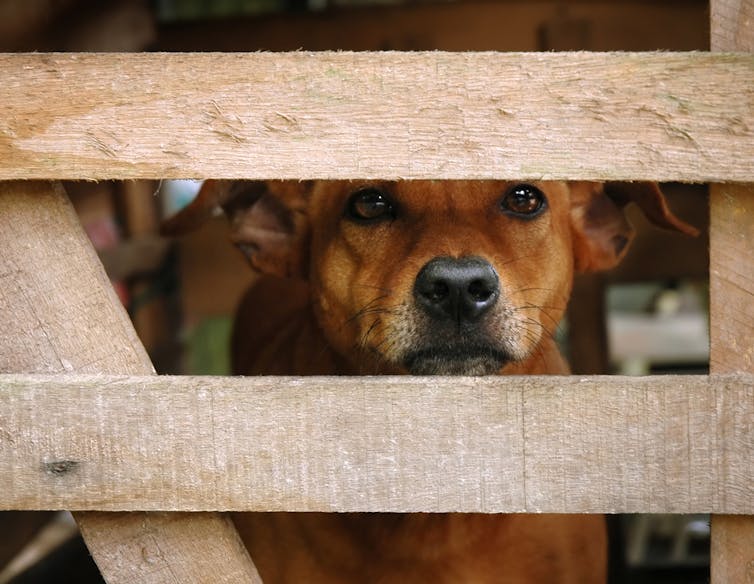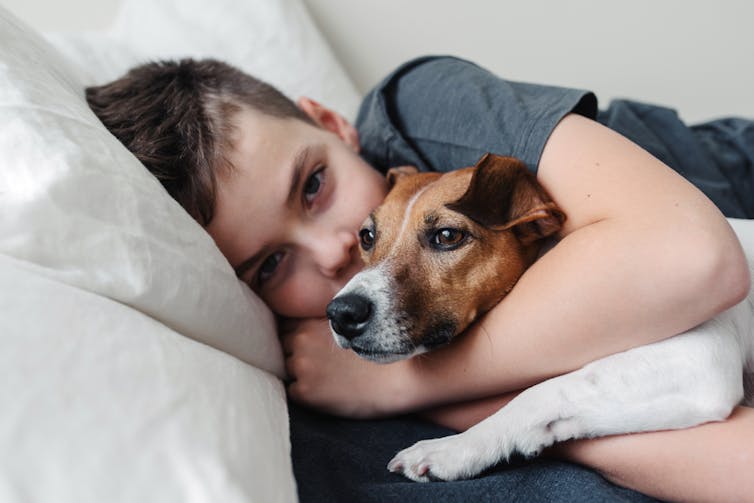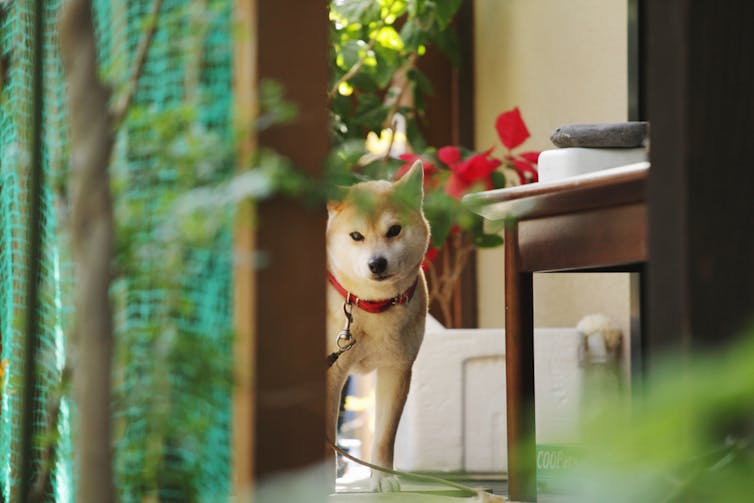Do Dogs Get Confused When Theyre Given to a New Family
Dog behaviour is extraordinarily flexible – this is why nosotros tin can keep them in our homes and take them to cafes with us at the weekend.
Nevertheless, there are ways in which evolution has not equipped dogs for the challenges of living in our world, and puppies must learn how to cope.
These are some of the things we exercise they struggle to empathize.
Baca juga: Is your dog happy? Ten mutual misconceptions virtually dog behaviour
1. We leave them solitary
As born socialites, dogs brand friends easily. Puppies are intensely interested in spending time with other dogs, people, and any species willing to interact with them socially. They ordinarily play, rest, explore and travel with company. Yet we oftentimes leave dogs alone: at dwelling, in kennels or the vet clinic.
In these situations, naive dogs can't be certain nosotros'll ever return to collect them. Just afterward experience are they likely to look a reunion, and even and then, their experience depends on the context.
At abode, we may try to enforce dog-gratis zones. Naturally, many dogs protest. How can they stay with their (man) social group when they're separated behind impenetrable barriers (doors)? This explains why dogs so ofttimes demand to exist let inside when their homo family unit is there, and why those with separation-related distress often find some solace in beingness indoors.

2. We are visually driven
Dogs alive in an olfactory world, while ours is chiefly visual. So, while TVs may offering a visual feast for humans, parks and beaches are an olfactory banquet for dogs.
An additional claiming is dogs move while investigating the world, whereas we often sit even so. They may not relish the inertia we enjoy in front of a noisy, flashing lite-box.
3. We change our shape and smell
Shoes, coats, wallets, briefcases, bags and suitcases: endless smells cling to these items after we take them into shops and workplaces, then back to our dogs. Cleaning products, soaps, deodorants and shampoos also change the scents our dogs are used to.
Towels, hats and numberless change our shape when we're using them. And when nosotros're pulling them on, jumpers and coats change our visual outline and may catch dogs unaware.
Baca juga: Preparation my dog taught me that information technology's people who really need grooming
Dogs change their coats at to the lowest degree once a year. In contrast, we change our external cladding every day. This ways the odours we carry are changing far more than dogs have evolved to expect.
In their olfactory globe, it must be puzzling for dogs to meet our constantly changing smells, specially for a species that uses odor to place familiar individuals and intruders.
4. Nosotros like to hug
How humans use their forelimbs contrasts sharply with how dogs do. We may use them to carry large objects a dog would have to drag, but also to grasp each other and express affection.
Dogs grasp each other loosely when play-wrestling, and too when mating and fighting. Being pinned past another dog hinders a quick escape. How are puppies to know what a hug from a homo means, when that behaviour from a dog might be threatening?

v. We don't like to be bitten
Play-fighting is fun for many puppies and helps them bond with other dogs. Just they must monitor the behaviour of other dogs in play-fights and know when they've used their tiny, razor-sharp teeth excessively.
Humans are much more than susceptible to pain from playful puppy jaws than other dogs are, and and so we can react negatively to their attempts to play-fight with us.
Dogs interact with objects almost entirely with their cage. And to feed, they use their jaws, teeth and natural language.
Baca juga: Understanding canis familiaris personalities tin can assist foreclose attacks
Dogs also "oral fissure" other dogs when playing, expressing affection and communicating everything from "more than" to "please don't" to "Back off!". So, naturally, they try to utilise their mouths when communicating with u.s., and must exist puzzled by how often nosotros take offence.
half-dozen. We don't consume food from the bin
Dogs are opportunists who naturally acquire food anywhere they find it. In contrast, we present them with nutrient in dishes of their ain.
Puppies must be puzzled by our reaction when we find them snacking from benches and tables, in lunchboxes and kitchen bins. Nosotros should not be surprised when dogs unearth food nosotros left somewhere accessible to them.
Baca juga: Whose best friend? How gender and stereotypes tin shape our relationship with dogs
7. Nosotros share territories
We visit the territories of other dogs, bringing back their odours, and let unfamiliar man and canine visitors to enter our dogs' abode. Dogs have not evolved to have such intrusions and threats to their rubber and resources.
We shouldn't be surprised when our dogs treat visitors with suspicion, or when our dogs are treated with hostility when nosotros bring them to the homes of others.

8. We employ our hands a lot
Sometimes our easily deliver food, scratches, massages and toys. Other times, they restrain dogs, trim nails, administer ointments or tablets, and groom with brushes and combs that may pull hair.
No wonder some dogs abound to fright the human hand equally it moves well-nigh them. Nosotros tin can make it easier for dogs to accept many types of manus-related activities if we train them to cooperate with rewards.
But humans oft misread their fright and may even greet it with violence which compounds the problem. Mitt-shy dogs tin easily become defensive and find their way into pounds and shelters, where life expectancy for nippers and biters is poor.
On the whole, dogs bear witness a remarkable ability to arrange to the puzzles nosotros throw at them. Their behavioural flexibility offers u.s.a. lessons in resilience and how to alive only and socially. Our challenge is to understand the absence of guile and malice in everything they do.
Source: https://theconversation.com/8-things-we-do-that-really-confuse-our-dogs-122616
0 Response to "Do Dogs Get Confused When Theyre Given to a New Family"
Post a Comment